When Is Vietnam’s Ghost Month in 2025? Explore Spirits, Superstitions, and Celebrations
By Trang Ha
Post Views: 43
When Is Vietnam’s Ghost Month in 2025? Explore Spirits, Superstitions, and Celebrations
If you’re planning to travel to Vietnam in late summer and find yourself wondering why the streets smell like incense, the markets are covered in joss paper, and everyone’s just a tad more cautious than usual—surprise!
You’ve stumbled into Ghost Month in Vietnam.
Also known as “Thang co hon” (the Month of Lonely Spirits), this is when tradition, taboo, and a whole lot of tasty offerings take centre stage.
In this guide, we’ll walk you through the what, when, where, and how of Ghost Month in Vietnam 2025—with plenty of travel tips along the way.
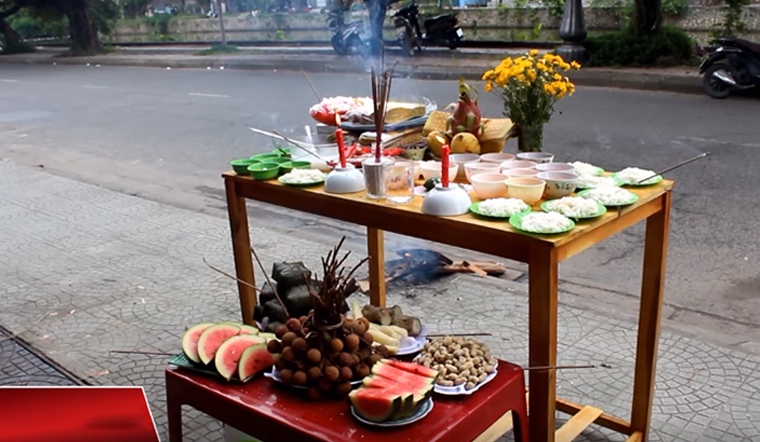
What is Ghost Month in Vietnamese Culture?
In Vietnamese tradition, a person consists of two parts: the body and the spirit. After death, the spirit lingers in the afterlife — and where it goes depends on how the person lived.
Those with good karma get reincarnated; those with…less-than-stellar records get sent to the underworld.
But during Ghost Month, Pluto (aka Diem Vuong, the Vietnamese King of the Underworld) opens the spiritual gates.
Ancestors return home to be honoured by descendants. Unfortunately, not all spirits are lucky enough to have living relatives.
These “hungry ghosts” — lonely, forgotten, and sometimes angry — roam the earth, causing bad luck or mischief if not appeased.
Hence: food, fire, and plenty of incense.

What is Ghost Month Called in Vietnam?
Ghost Month in Vietnam may be one concept, but it goes by several meaningful names:
1. Thang Co Hon – Month of Lonely Spirits
This is the most commonly used name for Ghost Month in everyday Vietnamese conversation. “Tháng” means month, and “Cô Hồn” refers to wandering, homeless spirits.
2. Tet Trung Nguyen – Mid-Origin Festival
This more formal name is rooted in Vietnamese folk religion and Taoist philosophy.
“Trung Nguyen” literally means “Middle Origin,” representing a spiritual midpoint in the year when souls are released from hell for salvation.
The word “Tet” signals a festival, like Tet Nguyen Dan (Lunar New Year). This name highlights the month as a significant spiritual event.
3. Le Vu Lan – Vu Lan Festival of Filial Piety
Though not synonymous with Ghost Month, the Vu Lan Festival happens on the 15th day of the 7th lunar month and deeply overlaps with the Ghost Month’s spirit.
4. Thang Bay Am Lich – The 7th Lunar Month
This neutral term simply refers to the seventh month in the lunar calendar, without a loaded spiritual or emotional connotation.
Many Vietnamese use this when referring to the time period, especially in business or scheduling, while still acknowledging the cultural importance behind it.
5. Thang Quy – Month of Ghosts/Demons (Less Common)
Though less widely used, this term occasionally appears in rural folklore or poetic storytelling.
“Quy” means demon or ghost, and the phrase reflects a heightened sense of fear or misfortune, emphasizing the supernatural tone of the month.

The Origin Story: Where Did Ghost Month Come From?
1. Taoist Tales: Hell’s Gates Are Opened
According to Taoist tradition, on the 2nd day of the seventh lunar month, the King of Hell flings open the gates of the underworld, allowing spirits to roam among the living.
Don’t worry—they’re not here to cause trouble (unless they’re hangry).
2. Buddhist Roots: Vu Lan Festival of Filial Piety
From a Buddhist perspective, the month is linked to the tale of Maudgalyayana, who tried to rescue his mother from the realm of hungry ghosts.
His actions inspired the Vu Lan Festival—known as Wandering Souls Day in Vietnam—which honors parents and ancestors and promotes compassion, generosity, and gratitude.
3. Yin-Yang Vibes: A Month of Gloom and Spiritual Energy
The seventh lunar month is associated with Gui (Yin Water) in Eastern philosophy.
Combine that with the humid, rainy weather and you’ve got a perfect recipe for ghost stories, taboos, and heightened spiritual energy.

So… When Is Ghost Month in Vietnam 2025?
In 2025, Ghost Month falls during the seventh lunar month, which begins on August 23rd and ends on September 21st in the Gregorian calendar.
The key date to note is the 15th day of the lunar month (September 6th, 2025)—this is the Hungry Ghost Festival, the spiritual climax of the month.
Vu Lan Festival Vs. Ghost Month: Are they the Same?
Though they fall in the same lunar month, Vu Lan Festival and Ghost Month are not interchangeable.
| Aspect | Ghost Month | Vu Lan Festival |
| Origin | Folk beliefs, Taoism | Buddhist story of Maudgalyayana |
| Worship Focus | Wandering/lonely spirits | Parents, ancestors |
| Atmosphere | Mysterious, often superstitious | Solemn, warm, gratitude‑filled |
| Religious Status | Folk tradition | Major Buddhist festival |
| Cultural Meaning | Compassion for ghost community | Filial piety, family gratitude |
So while Vu Lan is all about filial piety and heartfelt remembrance, Ghost Month is more about keeping the roaming spirits happy and out of your business.
Interesting fact: On Vu Lan, you’ll often see people wearing red roses if their mothers are alive, and white roses if their mothers have passed.
How Is Ghost Month Celebrated in Vietnam?
First Day (August 23, 2025): Open for (Spiritual) Business
On the first day of the 7th lunar month, locals begin by burning paper votives (symbolic money), clothes, and even paper iPhones (yes, really) to help ghosts get by in the afterlife.
You’ll see families making food offerings — rice, fruit, even roast meats — and lighting incense outside homes, shops, and temples.
Hungry Ghost Festival (September 6, 2025)
This is the main event. Families gather for a communal dinner and outdoor ceremony. Makeshift altars pop up on sidewalks. Offerings include:
- Joss paper.
- Uncooked rice, peanuts, and noodles.
- Fruit, tea, and rice wine.
- Sometimes entire roast pigs.
Lanterns are sometimes released into rivers to guide spirits peacefully back to the underworld.
Final Day (September 21, 2025): Gates Are Closed
On the final day, people hold one last ceremony to say goodbye to the spirits.
Offerings are made, and lanterns released on rivers help lead spirits back to the underworld (with love and light, of course).
Ancestral pictures and ceremonial items are carefully put away until next year.
The Curious Custom of “Giut Co Hon” in Vietnam
In parts of Vietnam, especially Chinatown in Ho Chi Minh City, you might see locals (especially kids) scrambling to grab offerings after ceremonies.
It’s called “Giut Co Hon”—Snatching of the Spirits.
Some take it seriously as a way to earn blessings (or a few dong), others just see it as a fun tradition.
Either way, locals usually don’t mind. In fact, it is often believed to bring luck to both giver and receiver, when the offerings are snatched.
It’s chaotic, a bit cheeky, and seriously entertaining to watch.
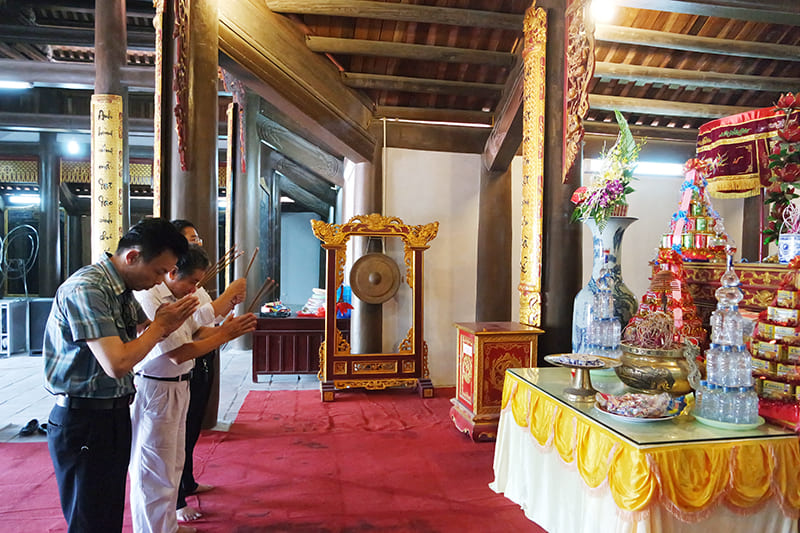
Where to Experience Ghost Month in Vietnam 2025
If you’re lucky enough to be in Vietnam during Ghost Month, you’ll see offerings and rituals everywhere — but some places go all out:
Hanoi
In the capital, especially around the Old Quarter, you’ll find sidewalks scattered with small fires—locals burning joss paper (votive money) to send to their ancestors in the spirit realm.
Temples like Tran Quoc Pagoda host Vu Lan ceremonies full of flowers, glowing lanterns, and trailing incense smoke.
Traveler tip: Don’t step over or through the fire piles. Spirits don’t like being walked on.
At Lazycat Hagiang Loop, the team often shares local insight and may even invite guests to observe their traditions and share in family dinners.
Ho Chi Minh City
Head to Cho Lon (the city’s vibrant Chinatown) and you’ll feel the pulse of Ghost Month.
It’s packed with paper effigy shops selling everything from spirit iPhones to paper villas.
Street corners become impromptu shrines with trays of fruit, roast chicken, sticky rice, and more — just don’t touch, and definitely don’t snack.
Temples like Ba Thien Hau glow with candles and bustling ceremonies, and yes, it’s totally fine to respectfully observe.
Hue and Hoi An
In central Vietnam, Ghost Month takes on a gentler, more traditional tone.
Hue, with its deep royal and spiritual roots, hosts large temple ceremonies where monks chant, bells ring, and flowers pile high on altars.
Hoi An, already dreamy with its glowing lanterns, ups the magic with Vu Lan rituals and floating lotus lanterns released on the Thu Bon River in honor of wandering souls.
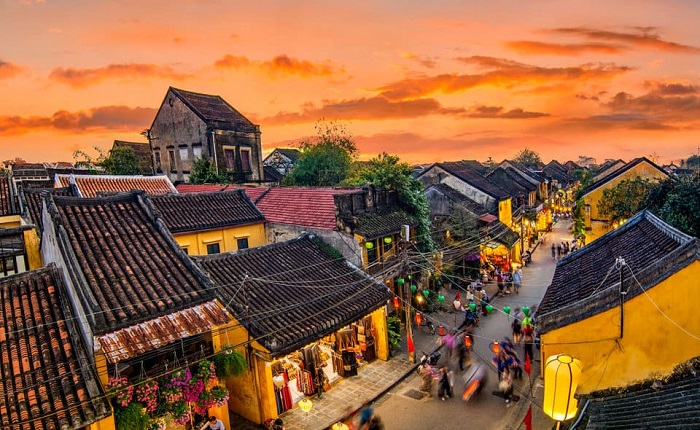
The Ha Giang Loop & Northern Villages
If you’re riding the Ha Giang Loop with Lazycat Hagiang Loop or out in Cao Bang — expect more intimate, family-based rituals with less tourist influence.
Wherever you are, ask before taking photos, and observe quietly. Locals usually appreciate interest as long as it’s done with respect.
Visiting Temples During Ghost Month
You don’t need to be religious to enjoy Vietnam’s temples—especially during Ghost Month.
Temples are often decorated with flowers, lights, and incense trails. Participation is welcome, and you can:
- Watch people pray, chant, or burn incense.
- Make a small offering (fruit, flowers, or even a respectful bow).
- Tie your own wish to a prayer tree (just ask for help if unsure).
- Take photos — if the space allows and you ask permission first
Here are some top temples to visit during Ghost Month:
- Tran Quoc Pagoda (Hanoi).
- Thien Mu Pagoda (Hue).
- Ba Thien Hau Temple.
And remember, shoes off, shoulders covered, and silence (or whispers) once inside.

How to Participate in Ghost Month Respectfully
Ghost Month may seem like a bit of fun, but it’s not a party. Here’s how to engage without crossing (spiritual) lines:
✅ DO:
- Make respectful offerings of food, flowers, and incense at temples or family altars.
- Burn joss paper and votives (fake money, clothes, houses) for ancestors and wandering souls—but only in designated areas.
- Light lanterns and candles on the night of Vu Lan to help guide spirits.
- Be generous during “giựt cô hồn”—a custom where people give out or grab offerings meant to spread luck.
- Participate in Vu Lan—many temples welcome foreigners to observe the ceremonies.
- Practice gratitude and honor your parents, living or deceased—Vu Lan is also a day of filial piety.
- Learn the meaning of local customs before mimicking them.
❌ DON’T:
- Don’t touch or eat ghost offerings without permission. This is a massive spiritual no-no.
- Don’t step over burning paper or offerings. Even accidentally — it’s seen as disrespectful.
- Don’t go swimming in rivers, lakes, or seas. Water is believed to be where spirits gather.
- Don’t hang wind chimes near your bed. It’s said they attract spirits while you sleep.
- Don’t prank or scare people. Superstitions say you could shock their soul loose!
- Don’t stand under or near banyan trees at night. Considered haunted hotspots.
- Don’t move house, sign contracts, get married, or start construction. Ghosts might meddle.
- Don’t get haircuts. Folk beliefs say it weakens your spiritual energy.
- Don’t whistle or call someone’s name at night. Ghosts might answer.
- Don’t burn votives randomly. It’s important to do it correctly, otherwise it invites the wrong energy.
- Don’t joke about ghosts. You might offend someone — or something.
- Don’t disrespect rituals. Even if you don’t believe in them.
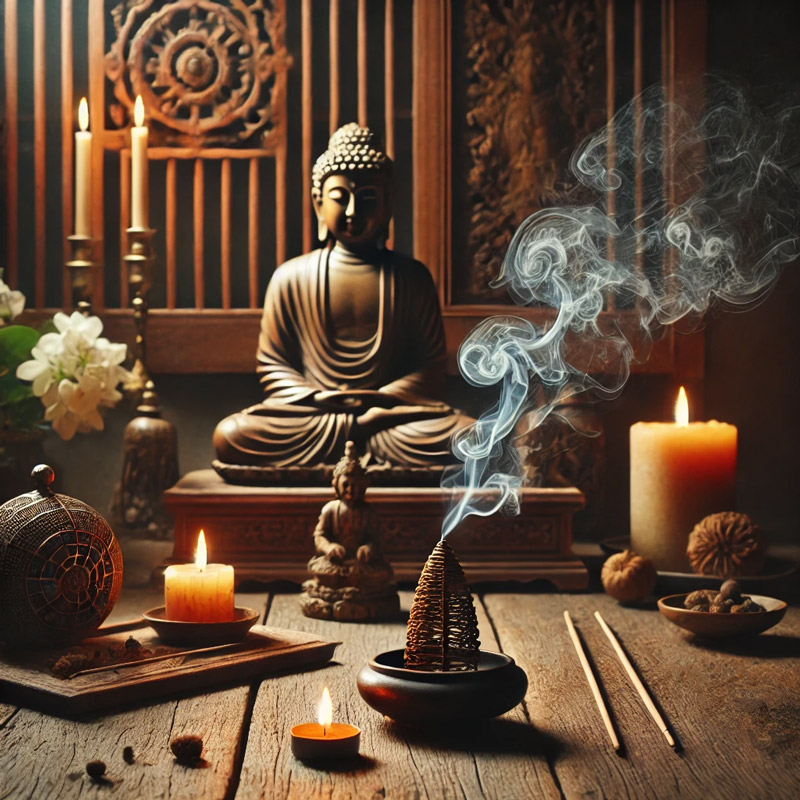
Traveler Tips: Making the Most of Ghost Month
- Plan Ahead: Avoid scheduling big life events (weddings, relocations) during late August–September.
- Stay respectful. Don’t mock rituals or interrupt ceremonies.
- Join in mindfully. Temples often welcome foreign guests — just observe the dress code.
- Respect Taboos Lightly: You don’t have to be a devotee, but following simple dos (offering a paper flower, eating vegetarian) goes a long way.
- Capture the Magic: Morning mist by pagoda lakes, sea of lanterns at dusk, and street “Giat Co Hon” frenzies make for epic photos — just be mindful and ask permission.
- Stay Flexible: Some attractions or restaurants may close for family ceremonies on Ram Thang Bay (around September 6, 2025). Check ahead.
- Embrace the Spirit: Ghost Month is as much about compassion as it is about caution. Keep an open mind and a playful heart!
Bonus: Other Festivals During Ghost Month in Vietnam
Nguyen Dinh Chieu Festival (Ben Tre, July 1 solar): Honours the famous poet, doctor, and patriot.
Ong Ba Chieu’s Mausoleum Festival (end of Ghost Month): Pays tribute to a beloved general and his wife, especially celebrated in HCMC.
Should You Travel During Ghost Month? Absolutely!
Despite the ghostly name and a few local superstitions, Ghost Month isn’t something to fear — it’s something to experience thoughtfully.
Locals may avoid risky ventures like moving house, weddings, or major surgeries during this time—but travel itself? Totally fine, especially for visitors who travel with cultural sensitivity.
In fact, Ghost Month is one of the most emotionally rich, atmospheric, and introspective times to explore Vietnam. From temple rituals to floating lanterns, quiet offerings to full-blown ceremonies—it’s all a reminder of how deeply Vietnamese people care about family, ancestry, and balance between worlds.
So don’t cancel your trip. Just pack a bit of curiosity and a respectful attitude.
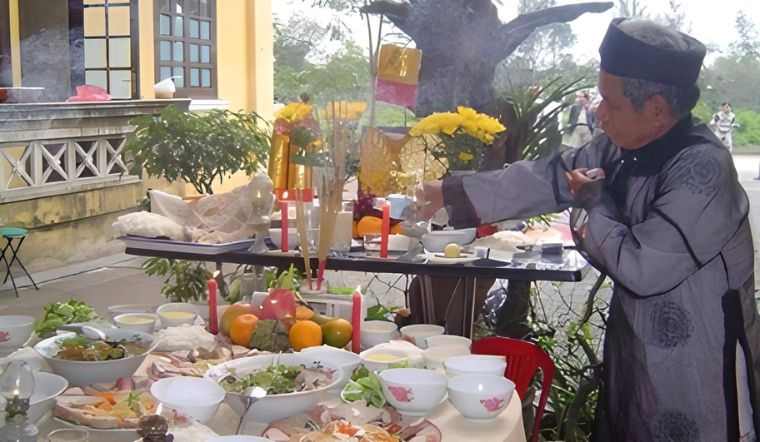
FAQs About Ghost Month in Vietnam
Q: Can I travel to Vietnam during Ghost Month?
A: Absolutely! For respectful travelers, it’s a deeply moving and meaningful time to witness Vietnam’s spiritual traditions in action.
But don’t worry: for respectful travelers, it’s also a deeply moving and meaningful time to witness Vietnam’s spiritual traditions in action.
Q: Is Ghost Month a national holiday?
A: No—there are no official closures—but temple events and private ceremonies are plentiful.
Q: Are foreigners expected to participate?
A: Participation is optional. A respectful nod—donating a small offering or joining a vegetarian meal—is always appreciated.
Final Thoughts: What Ghost Month Really Means
Forget Hollywood-style hauntings — Ghost Month in Vietnam is ultimately a time of compassion, community, and connection.
So if you’re in the country from late August to late September 2025, keep your eyes (and your third eye) open.
Ghost Month might just be the most unexpectedly beautiful time to explore Vietnam’s cultural soul.
And who knows? Those wandering spirits probably just want a bite to eat and a bit of peace — don’t we all?


